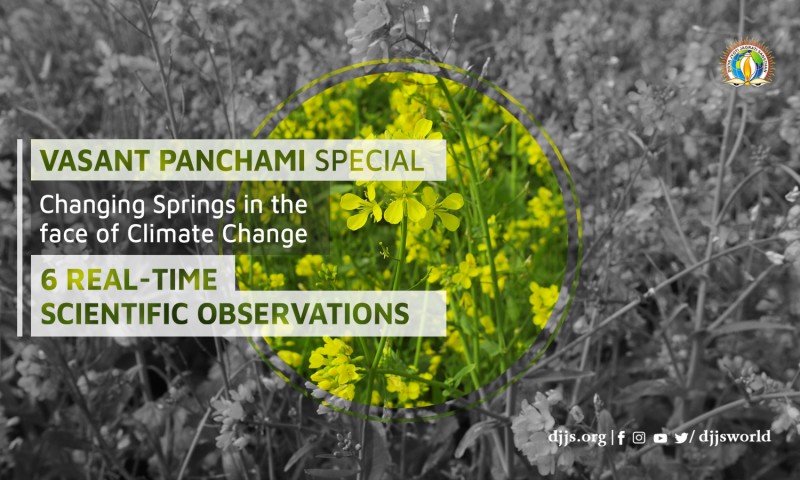Pleasant weather, brighter days, lustrous green growths, blooming flowers, chirping birds, clear skies & cool breeze, together mark the advent of king of all seasons – the Spring. This is the time when nature presses the refresh button, creative potential is triggered, and new life starts breathing all around.
This has been the description of spring archived in our memories & literatures across cultures. But this description might take a whole new turn, if the human race, you & me, continue to live as we do. Yes, human-induced climate change has hit our very cherished Spring season.
Here are SIX real- time scientific observations from across globe which highlight the adverse impacts of climate change on spring season.
1.Climate Change is causing SPRING TO START SOONER in UK
According to a landmark 50 year study, Climate change is causing spring to arrive earlier in the UK, causing disruption to natural life cycles which could make food prices rise & insect population collapse.
For Details Tap - https://www.independent.co.uk/climate-change/news/climate-change-spring-start-global-warming-insect-survey-a8849386.html
2.PROLONGED POLLEN SEASON a trouble for LUNGS in USA and Canada
A nearly three-decades-long study in USA and Canada reports that the pollen season has lengthened, starting 20 days earlier and lasting 8 days more. Pollen triggers asthma, allergies and other respiratory issues. Thus, such prolonged pollen seasons directly affects our health.
For Details Tap - https://edition.cnn.com/2021/02/12/health/climate-change-allergies-wellness/index.html

3.EARLY FRUITING & FLOWERING witnessed in Upper Himalayan Region
A field survey conducted by the Uttarkhand Forest Department has revealed that flowering & fruiting in four of the most common plants – Rhododendron, Kafal, Himalayan raspberry (Hisalu) & Himalayan cherry (Bhenkal) have been happening 3-4 months before the normal season. Their natural fruiting & flowering time is late spring or even summers, however, it is now taking place in late January instead.
For Details Tap - https://bit.ly/3u2GUwn

4.FALSE SPRING witnessed in Turkey
In Turkey, December 2020 was 2.6⁰C higher than the seasonal average. As a result, in Istanbul, some trees started flowering. Dr. Doganay Tolunay from the Istanbul University said “Normally, when the temperature is below 10 degrees, leaves fall from trees. When it is about 10 degrees, trees start to bloom. It is not normal to see trees blooming in December.”
For Details Tap - https://www.trtworld.com/life/climate-change-bares-its-many-faces-in-turkey-42852

5.Animals and plants shifting their HOME RANGE
Fifth assessment report of IPCC reports that on a global average, various terrestrial animals and plants have shifted 17 km towards the poles and 11m up in altitude per decade. As the species move up, it might lead to a territorial struggle, nutrition and affect their respective populations.
For Details Tap - https://www.downtoearth.org.in/news/animals-plants-shifting-home-ranges-faster-than-believed-43904
6. Changing Springs might affect your TEA.
Not just your health, weather, birds and animals but climate change might also be coming after your ‘chai time’! Variations in temperature and precipitation affect tea yield, and also change the complex balance of chemicals that gives tea its flavour and potential health benefits.
For Details Tap - https://www.nature.com/articles/d41586-019-00399-0
Nature has its own clock that governs the onset and duration of every season. Trees, birds, insects get their cue to reproduce, grow, nest, migrate from the change in climatic factors. A small change in it causes a ripple effect in the environment. And since humans are an integral part of Nature, a profound impact of this change in natural cycles is seen in both human physiology & psychology.
Ironically, the concrete jungle rarely allows us the city dwellers to notice subtle changes of a season which is why it is even more important that we be aware of these phenological changes being observed globally. Because this very disconnect between human & nature is the underlying cause of all environmental anomalies.
And what could have been better occasion than the celebrated welcome festival of spring – Vasant Panchami, to rebuild this connect with Nature. Vasant Panchami is a feat of ancient Indian Environmentalism, dedicated to Devi Saraswati, the goddess of knowledge, music, and art, everything finer in life. It is only fitting that the nature, in this season, is in its most beautiful form. The best way to celebrate this would be to learn from our knowledge on climate change that the impact is here for us to see and experience. We ought to turn back to ancient Indian lifestyles which were innately pro- environmental. . Each lifestyle choice has to be weighed against its potential to harm the environment. Only then we would honour Maa Saraswati in true sense and keep her gift of colors, chirps, fragrance and beauty of spring alive.

